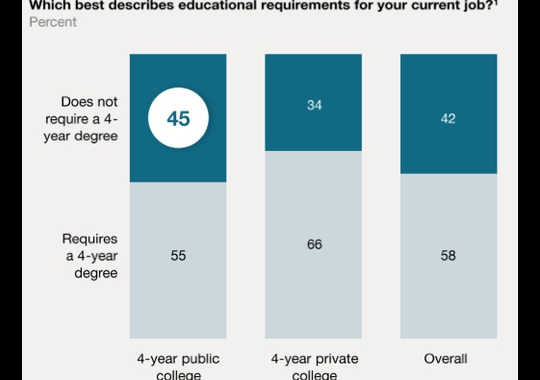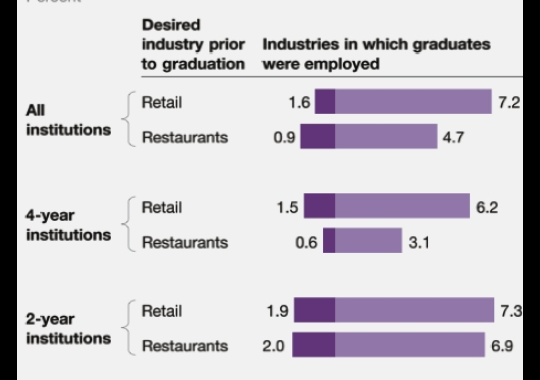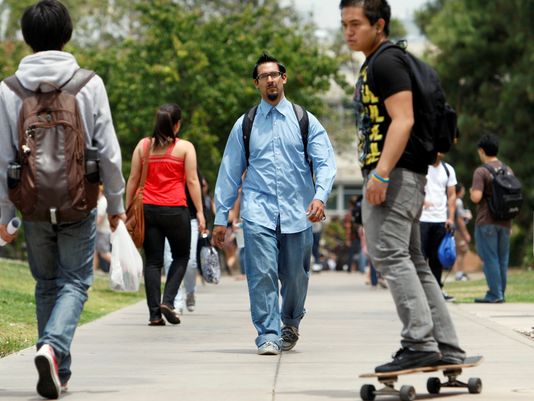College grads: overqualified and underprepared?
College is big business. Nearly 2 million college students are set to graduate this year and enter the real world. There are many benefits to investing in a higher education, but with the cost of a degree skyrocketing and heavy college debt loads weighing on graduates, a new study examines if students are receiving the most bang for their buck.
Research around the globe shows a positive correlation between college education and levels of individual and national well-being. Yet, the full potential of graduates is not being realized, as nearly half of graduates from four-year colleges say they are in jobs that do not require a four-year degree, according to a wide-ranging study by consulting firm McKinsey & Co. and research data outfit Chegg. This is leading to college debt causing regret. The study involves nearly 5,000 graduates, with the majority finishing college between 2009 and 2012.

Data on responses to the question "which best describes educational requirements for your current job?" posed to recent graduates(Photo: Wall Street Cheat Sheet)
Forty-five percent of graduates from a four-year public college say they are in jobs that do not require a four-year degree. This is 11 percentage points higher than graduates from a four-year private college. Overall, 42% of those polled feel they are overqualified for their current job.
The results echo findings from the Bureau of Labor Statistics, which showed that 48% of employed U.S. college graduates are in jobs that require less than a four-year college education. For example, more than 15% of taxi drivers and firefighters have a college degree, compared to only 1% to 2% in 1970.
WALL ST. CHEAT SHEET: College debt bubble mimics housing bubble, bankers say[1]
With student loans being handed out like candy, virtually anyone is able to attend college these days, creating a large supply of graduates in a sluggish economy. McKinsey & Co. finds that the retail and restaurant industries were among the least desired fields for students, but they end up employing four to five times the number of graduates who said they actually wanted to work in those industries.
"Assuming our sample is broadly representative of the 1.7 million U.S. graduates who earned bachelor's degrees this year, this means roughly 120,000 young Americans who'd rather work elsewhere have taken jobs as waiters, salespeople, cashiers, and the like — because that's the only work they could find. That's one every five minutes," the report says.
The most popular fields of choice were health and business services, with 35% of students saying they wanted to enter these sectors. However, only 25% found work in them. Overall, the study finds that four in 10 graduates of the nation's top 100 colleges were unable to get jobs in their chosen field.
The value of college is also being debated in terms of real-world preparation. Frustration is growing among employers, because many graduates lack the "life skills" needed for the job. Graduates themselves also feel the same way, as one in three say they do not feel college prepared them well for employment. This sentiment was found to be the highest among those who majored in visual and performing arts and liberal arts. Regardless, nearly a third of science, business, economics, and finance graduates felt the same way. The feeling is even more widespread with graduates of two-year colleges.

Data above shows difference between desired and actual job industry among graduates of 4-year and 2-year institutions(Photo: Wall Street Cheat Sheet)
On the positive side, students who gained work experience while in college felt better prepared. The report explains, "Graduates of the top 100 four-year programs who gained real work experience (for instance, completing an internship, working part-time, or participating in employer mentorship programs) feel better prepared for the workplace. Of those with such work experience, 77% say college prepared them well for employment, compared with 59% of students who lacked similar experience."
Ironically, graduates can help themselves avoid the pitfalls of college by becoming better educated. Students who decide to attend college need to do their homework ahead of time. Half of graduates failed to look at graduation rates when selecting a college. Furthermore, four in 10 did not look at job placement or salary records.
Additional research and knowledge can make all the difference in the college experience. In fact, half of graduates polled in the study said they would choose a different school or major if they had another chance.
Despite any intrinsic value, liberal arts graduates fare worse than average in all measures of the study. They tend to be lower paid, deeper in debt, less happily employed, and slightly more likely to wish they had done things differently.
In contrast, graduates who majored in science, technology, engineering, mathematics, or business management scored above average in most measures. They report being better prepared for employment and have fewer regrets about their college experience.
USA TODA
Y content partner offering financial news and commentary. Its content is produced independently of
USA TODAY
.
References
- ^ http://www.usatoday.com/story/money/business/2013/05/11/college-debt-bubble-looks-like-housing-bubble/2151555/ (www.usatoday.com)
- ^ http://www.wallst.cheatsheet.com/ (www.wallst.cheatsheet.com)










